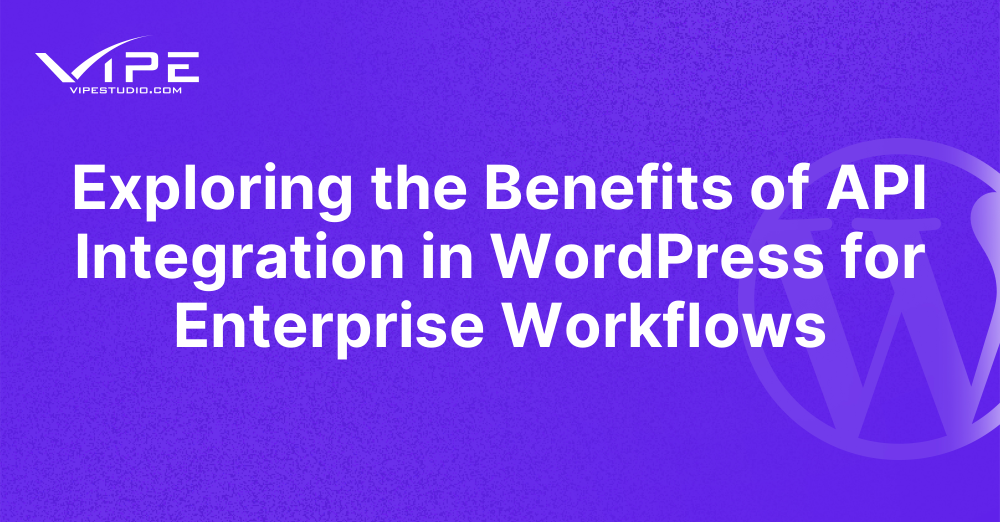18.01.2025
WordPress Development
Exploring the Benefits of API Integration in WordPress for Enterprise Workflows
READING TIME: MIN
Table of Content
API integration has revolutionized the way enterprises manage their workflows, and WordPress, as a leading content management system, is no exception. By connecting WordPress to external tools and platforms, businesses can streamline operations, improve efficiency, and unlock new possibilities. In this article, we’ll explore the role of API integration in WordPress and how it enhances enterprise workflows.
What Is API Integration in WordPress?
APIs (Application Programming Interfaces) allow different software applications to communicate and exchange data. In the context of WordPress, API integration connects your website to external services, enabling seamless data sharing and functionality enhancement.
From CRM systems and marketing tools to custom applications, API integration ensures your WordPress site becomes a dynamic hub that supports enterprise-grade operations.
Enhancing Enterprise Workflows Through Automation
One of the key benefits of API integration is the automation of repetitive tasks, which saves time and reduces human error. Here’s how it works:
- Automated Data Syncing: APIs enable real-time data synchronization between WordPress and tools like CRMs, ERPs, or analytics platforms, ensuring up-to-date information across all systems.
- Content Distribution: Automatically share blog posts, product updates, or other content across multiple platforms, including social media and email marketing tools.
- Order Processing: For eCommerce enterprises, APIs connect WordPress to payment gateways, inventory systems, and shipping providers to streamline order management.
These automated processes free up resources, allowing teams to focus on strategic initiatives.
Improving Data Accessibility and Decision-Making
Enterprises thrive on data, and API integration enhances data accessibility by connecting WordPress with analytics and reporting tools. Key advantages include:
- Unified Dashboards: Combine data from WordPress and other platforms into a single dashboard for a comprehensive view of your operations.
- Real-Time Insights: APIs provide live data feeds, enabling quicker and more informed decision-making.
- Custom Reporting: Generate tailored reports that align with your business KPIs, providing actionable insights.
By leveraging API integration, enterprises can harness their data more effectively to drive growth and innovation.
Expanding Functionality with Third-Party Integrations
API integration empowers WordPress to function beyond its default capabilities by incorporating third-party services. Examples include:
- CRM Integration: Connect WordPress with platforms like Salesforce or HubSpot to manage customer relationships seamlessly.
- Marketing Automation: Integrate tools like Mailchimp or ActiveCampaign to automate email campaigns and track engagement.
- Cloud Storage: Link WordPress with cloud storage providers like Google Drive or Dropbox for efficient file management.
These integrations ensure that WordPress adapts to the unique needs of your enterprise.
Streamlining Workflows for Remote Teams
With remote work becoming the norm, enterprises require systems that facilitate collaboration across distributed teams. API integration supports this by:
- Collaboration Tools: Integrating WordPress with platforms like Slack or Microsoft Teams enhances team communication and project management.
- Content Sharing: APIs allow teams to share and update content in real-time, improving productivity and reducing delays.
- Task Management: Tools like Asana or Trello can be integrated with WordPress for streamlined task assignment and tracking.
These capabilities ensure remote teams stay connected and aligned, no matter where they are.
Challenges of API Integration and How to Overcome Them
While API integration offers immense benefits, enterprises may face certain challenges, such as:
- Complex Implementation: Setting up and managing API integrations requires technical expertise. Collaborating with experienced developers simplifies this process.
- Data Security: APIs must be configured securely to prevent unauthorized access or data breaches. Implementing encryption and authentication protocols is essential.
- Performance Impact: Poorly optimized APIs can slow down your website. Regular monitoring and performance tuning help mitigate this risk.
With the right strategies and expertise, these challenges can be effectively managed to maximize the benefits of API integration.
Why Partner with Vipe Studio for API Integration?
At Vipe Studio, we specialize in crafting tailored API integration solutions for enterprises. Our services include:
- Custom API development to meet your unique business requirements.
- Secure integration with third-party platforms and tools.
- Performance optimization to ensure seamless data flow.
- Ongoing support and troubleshooting for reliable operations.
If you’re ready to transform your workflows with API integration, contact Vipe Studio today. Let’s unlock the full potential of your WordPress website.
Conclusion: Transforming Enterprise Operations with API Integration
API integration in WordPress is a game-changer for enterprises seeking to streamline operations, enhance data accessibility, and expand functionality. By connecting WordPress with the tools and platforms that power your business, you can achieve greater efficiency, better decision-making, and a competitive edge in your industry. Partnering with experts like Vipe Studio ensures your API integration journey is smooth, secure, and successful.
More on The Topic
- The Dark Side of WordPress Plugins: A Provocative Exploration
- The Human Cost of Poor WordPress Architecture
- Governance, Ownership, and Responsibility in WordPress Projects
- Product Thinking in WordPress Development
- WordPress Architecture Decisions and Their Business Impact
The content of this website is copyrighted and protected by Creative Commons 4.0.



